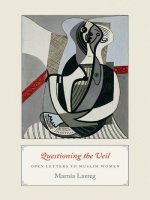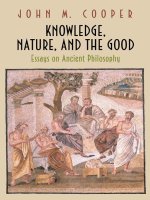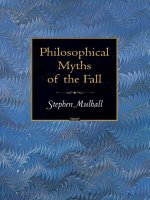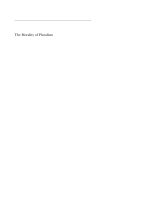princeton university press philosophical myths of the fall aug 2007
Bạn đang xem bản rút gọn của tài liệu. Xem và tải ngay bản đầy đủ của tài liệu tại đây (1.11 MB, 137 trang )
PHILOSOPHICAL MYTHS OF THE FALL
•
•
PRINCETON MONOGRAPHS
IN PHILOSOPHY
Harry Frankfurt, Editor
•
•
The Princeton Monographs in Philosophy series
offers short historical and systematic studies
on a wide variety of philosophical topics
Justice Is Conflict by STUART HAMPSHIRE
Liberty Worth the Name by GIDEON YAFFE
Self-Deception Unmasked by ALFRED R. MELE
Public Goods, Private Goods by RAYMOND GEUSS
Welfare and Rational Care by STEPHEN DARWALL
A Defense of Hume on Miracles by ROBERT J. FOGELIN
Kierkegaard’s Concept of Despair by MICHAEL THEUNISSEN
Physicalism, or Something Near Enough by JAEWONG KIM
Philosophical Myths of the Fall by STEPHEN MULHALL
Fixing Frege by JOHN P. BURGESS
PHILOSOPHICAL
MYTHS
OF THE FALL
)
Stephen Mulhall
PRINCETON UNIVERSITY PRESS
P RI NC ETON AN D OXF OR D
Copyright © 2005 by Princeton University Press
Published by Princeton University Press, 41 William Street,
Princeton, New Jersey 08540
In the United Kingdom: Princeton University Press, 3 Market Place,
Woodstock, Oxfordshire OX20 1SY
All Rights Reserved
Second printing, and first paperback printing, 2007
Paperback ISBN-13: 978-0-691-13392-8
THE LIBRARY OF CONGRESS HAS CATALOGED THE CLOTH EDITION
OF THIS BOOK AS FOLLOWS
Mulhall, Stephen, 1962–
Philosophical myths of the fall / Stephen Mulhall.
p. cm. — (Princeton monographs in philosophy)
Includes bibliographical references and index.
ISBN 0-691-12220-2 (alk. paper)
1. Fall of man. 2. Philosophical anthropology.
3. Nietzsche, Friedrich Wilhelm, 1844–1900—Contributions in
philosophical anthropology. 4. Wittgenstein, Ludwig, 1889–1951—
Contributions in philosophy and anthropology. 5. Heidegger, Martin,
1889–1976—Contributions in philosophical anthropology.
I. Title. II. Series.
BD450.M774 2005
128′.092′2—dc22
2004054931
British Library Cataloging-in-Publication Data is available
This book has been composed in Janson Text and Centaur display
Printed on acid-free paper. ∞
press.princeton.edu
Printed in the United States of America
3 5 7 9 10 8 6 4 2
Contents
)
Acknowledgments
vii
Introduction
1
CHAPTER 1
The Madman and the Masters: Nietzsche
16
CHAPTER 2
The Dying Man and the Dazed Animal: Heidegger
46
CHAPTER 3
The Child and the Scapegoat: Wittgenstein
85
Conclusion
118
Index
125
This page intentionally left blank
Acknowledgments
)
I WOULD LIKE TO THANK PAUL CORTOIS, and the other members
of the Institute of Philosophy and the Faculty of Theology at
the Catholic University of Leuven, who kindly invited me to
give a series of lectures there, as part of a larger project on
religion in which they are collaborating with the Religious
Studies department at Antwerp University, and thereby encouraged me to try out early versions of each of these chapters
before an exceptionally knowledgeable and accommodating audience. I would particularly like to thank Martin Stone, who
not only made my week in Leuven outside the lecture hall a
matter of real social and intellectual pleasure, but also acted as
respondent to one of my lectures; and thanks are also due to
William Desmond and Rudi Visker, my other respondents,
with whom I also managed to combine stimulating conversation with good Belgian beer. Thanks, as always, go to Alison,
Eleanor, and Matthew, for allowing me to spend the time
needed to transform the text of my Leuven lectures into this
book, and for distracting me from that text whenever I emerged
from my study.
A version of chapter 1 appeared in Tijdschrift voor Filosofie 66/1
(March 2004). Portions of chapters 2 and 3 traverse ground
that I crossed earlier in parts of my Inheritance and Originality
(Oxford University Press: Oxford, 2001), as well as in Heidegger
viii
ACKNOWLEDGMENTS
and Being and Time (Routledge: London, 1996); but juxtaposing my interpretations of Heidegger and Wittgenstein with a
reading of Nietzsche for the first time allowed me to see ways
of modifying, refining, and going on from all three thinkers in
ways that I could not otherwise have managed.
PHILOSOPHICAL MYTHS OF THE FALL
•
•
This page intentionally left blank
Introduction
)
Now the serpent was more subtil than any beast of the
field which the Lord God had made. And he said unto
the woman, Yea, hath God said, Ye shall not eat of every
tree of the garden?
And the woman said unto the serpent, We may eat of
the fruit of the trees of the garden: but of the fruit of
the tree which is in the midst of the garden, God hath
said, Ye shall not eat of it, neither shall ye touch it, lest
ye die.
And the serpent said unto the woman, Ye shall not
surely die: For God doth know that in the day ye eat
thereof, then your eyes shall be opened and ye shall be
as gods, knowing good and evil.
And when the woman saw that the tree was good for
food, and that it was pleasant to the eyes, and a tree to
be desired to make one wise, she took of the fruit
thereof, and did eat, and gave also unto her husband
with her; and he did eat.
And the eyes of them both were opened, and they
knew that they were naked; and they sewed fig-leaves
together and made themselves aprons.
And they heard the voice of the Lord God walking
in the garden in the cool of the day; and Adam and his
wife hid themselves from the presence of the Lord God
2
INTRODUCTION
amongst the trees of the garden. And the Lord God
called unto Adam and said unto him, Where art thou?
And he said, I heard thy voice in the garden, and I
was afraid, because I was naked; and I hid myself.
And he said, Who told thee that thou wast naked?
Hast thou eaten of the tree, whereof I commanded thee
that thou shouldst not eat?
And the man said, the woman whom thou gavest to
be with me, she gave me of the tree, and I did eat. And
the Lord God said unto the woman, What is this that
thou hast done? And the woman said, The serpent beguiled me, and I did eat.
And the Lord God said unto the serpent, Because
thou hast done this, thou art cursed above all cattle, and
above every beast of the field; upon thy belly shalt thou
go, and dust thou shalt eat all the days of thy life; and I
will put enmity between thee and the woman, and between thy seed and her seed; it shall bruise thy head,
and thou shalt bruise his heel.
Unto the woman he said, I will greatly multiply thy
sorrow and thy conception; in sorrow thou shalt bring
forth children; and thy desire shall be to thy husband,
and he shall rule over thee.
And unto Adam he said, Because thou has hearkened
unto the voice of thy wife, and hast eaten of the tree, of
which I commanded thee, saying, Thou shalt not eat of
it: cursed is the ground for thy sake; in sorrow shalt
thou eat of it all the days of thy life; thorns also and thistles shall it bring forth to thee; and thou shalt eat the
herb of the field; in the sweat of thy face thou shalt eat
bread, till thou return unto the ground; for out of it
wast thou taken: for dust thou art and unto dust shalt
thou return.
And Adam called his wife’s name Eve; because she
was the mother of all living.
INTRODUCTION
3
Unto Adam also and to his wife did the Lord God
make coats of skin, and clothed them. And the Lord
God said, Behold, the man is become as one of us, to
know good and evil; and now, lest he put forth his hand,
and take also of the tree of life, and eat, and live for
ever: therefore the Lord God sent him forth from the
garden of Eden, to till the ground from whence he was
taken. So he drove out the man; and he placed at the
east of the garden of Eden cherubims, and a flaming
sword which turned every way, to keep the way of the
tree of life.
—Genesis 3
IN AFTER VIRTUE, ALASDAIR MACINTYRE suggests that the advent of the Enlightenment disrupted the existing structure of
moral reasoning in a distinctive and deeply damaging way.1
Hitherto, moral principles had functioned as a means of ensuring that human beings fulfilled their telos; they effected a transformation from raw, uncultivated human modes of being to
ones in and through which human creatures lived well or flourished, realizing the full potential of their distinctive nature.
Since the Enlightenment systematically rejected any teleological forms of understanding of the natural world (for a variety
of reasons ranging from the apparently definitive overturning
of Aristotelian modes of natural science by those based on more
mathematical and mechanical models of the material realm, to
the long-established association of such teleological forms of
understanding with conservative—even reactionary—moral,
political, and religious traditions), it could not make sense of
human beings, and hence of morality, in such terms. But then
1
Duckworth: London, 1981.
4
INTRODUCTION
it faced the task of trying to find an alternative justification for
the basic moral principles it had inherited—principles that deliberately and systematically went against the grain of untutored human nature.
According to MacIntyre’s view, invoking the demands of reason was doomed to failure, since rationality in morals (as elsewhere) acquires substance only insofar as it operates within the
context of a particular framework of moral concepts and moral
understanding—what he calls a tradition; and of course, a fundamental aspect of the autonomy that Enlightenment thinkers
sought (both for individual moral and political beings, and for
specific spheres of human culture) was precisely freedom from
the dead hand of tradition (understood as embodying claims to
authority lacking any genuinely rational basis). Hence, once the
failure of this project of finding a tradition-free rational
grounding for morality became evident, the unfolding history
of the West in the aftermath of the Enlightenment became one
in which, as the common culture gradually watered down the
demanding content of moral principles (bringing morality
more into line with human nature as experience presents it, on
the grounds that moral principles which demand that we subject that nature to radically transformative cultivation are
merely arbitrary impositions from the superstitious past), philosophers gradually came to suspect that morality as a cultural
structure was simply an exercise in coercive power (whether by
specific cultures, or specific classes, or specific kinds of individual). The only alternative that MacIntyre can see to this
Nietzschean vision of a vanishing dimension of evaluation in
everyday human life, is a return to Aristotelian—more precisely, to Thomist—thinking, in which the idea of a human
telos not only is capable of being made intelligible in the face
of everything that the Enlightenment claimed to know, but also
can make more sense of the difficulties and confusions confronting other intellectual traditions which lack that concept
INTRODUCTION
5
than they can make of the difficulties with which Thomism itself must deal.2
To worry overmuch about the objective scholarly validity of
every claim MacIntyre makes about the central figures of the
Enlightenment period and its aftermath would risk missing the
main point of his enterprise. For its real starting point lies in
the present—in MacIntyre’s sense that we currently view the
claims of morality upon us as incomprehensibly demanding.
And just as he argues that the individual human self can make
sense of her present position, and hence of herself, only
through the unity conferred by a narrative showing how she
came to occupy it, so MacIntyre’s book as a whole attempts to
make sense of our collective moral condition by recounting it
as the latest episode in the historical narrative of our culture.
And since it is also central to his argument that there can be
no perspective-independent account of moral phenomena, we
must expect his account of our moral condition to be oriented
by his own (first Aristotelian, and later Thomist) moral concepts and resources. In other words, the master narrative of
After Virtue asks primarily for ethical evaluation—it offers a
myth of our origins that must be tested against our current
experience, in the name of a morally intelligible future.
But MacIntyre’s own thought also has a narrative structure,
that we must—according to his own lights—take into account.
It is, I think, undeniable that in the first phase or episode of
his recent work, post-Enlightenment thinking is presented as
conflating its rejection of certain religious conceptions of the
human telos with a rejection of the very concept of a human
telos, and thereby as eliminating the option of an Aristotelian
2
For a more detailed elaboration, and critical evaluation, of MacIntyre’s
deliberately simplified and dramatic portrait of our present cultural situation,
see chaps. 2 and 6 and the conclusion of Mulhall and Swift, Liberals and Communitarians, 2nd ed. (Blackwell: Oxford, 1996).
6
INTRODUCTION
conception of morality that is indebted neither to the Enlightenment nor to its religious enemies. But in the books succeeding After Virtue (beginning with Whose Justice? Which Rationality?), MacIntyre shifts his moral allegiance from Aristotle
to Aquinas. In so doing, he not only suggests that the postEnlightenment liberal tradition that he earlier accused of
lacking room for any concept of human flourishing might be
better viewed as having, rather, an inadequate conception of
it (how, after all, could a tradition with liberalism’s weight of
historical and social reality ever really have lacked what he himself presented as essential to any coherent moral perspective?);
he also implies that the Enlightenment’s primary mistake was
in fact its rejection of the distinctively Christian inflection of
that concept.
Even if we prefer MacIntyre’s earlier analysis to his later, we
could plausibly argue that, if the Enlightenment is best understood as founded on a certain kind of resistance to the very
concept of a human telos, such resistance without doubt originated—and found its most passionate expression—in a resistance to the specifically religious idea of the human telos as
involving a relation to God, and of those who fail to fulfil that
telos as existing in a state of original sin. The Christian doctrine
of original sin is, of course, the subject of multiple interpretations, disputations, and reformulations across two millennia of
theological and liturgical conversation and controversy; but at
its core is the conception that human nature as such is tragically
flawed, perverse in its very structure or constitution. Human
beings are not only naturally capable of acting—even perhaps
disposed to act—sinfully, but are always already turned against
themselves, against the true and against the good, by virtue of
their very condition as human. Hence, that sinful orientation
will distort and ultimately invalidate any efforts they might
make by themselves to alter that orientation; the only possible
solution lies in their attaining a certain kind of orientation to
the divine. But it is not just that without drawing on transcen-
INTRODUCTION
7
dental sources they cannot overcome their perversity; it is also
that whether or not such resources are available to draw upon
is not up to them—it is not within their power to ensure that
they get the help they need, for that too is ultimately in the
hands of the divine, an aspect of grace.
Such a doctrine patently violates a variety of interrelated and
central Enlightenment precepts. It is fundamentally offensive
to any conception of morality that places human autonomy at
its heart; for it entails that our very ability to orient ourselves
toward the good is dependent upon transcendental spiritual
sources, and asserts the direct opposite of the liberal understanding of human beings as the self-originating sources of
moral value (as Rawls puts his Kantian conception of the matter). For the Christian, we are, if anything, the self-originating
source of sin; hence, our only hope of regaining any contact
with goodness is by dying to ourselves. It is also offensive to
reason—as is evident in the way the Genesis story of the Fall
not only posits Adam’s moral responsibility for the deed that
constitutes his acquisition of the central precondition for moral
responsibility, but also presents what appear to be the constitutive conditions for any recognizably human existence (reproduction, cultivation of the earth, death, even self-consciousness
or self-awareness) as modifications—more specifically, as selfinflicted and penal deformations—of our truly human nature.
Perhaps, however, the central source of offence in this doctrine emerges most clearly if we note a distinction drawn by
Wittgenstein:
People are religious to the extent that they believe themselves to be not so much imperfect as sick.
Anyone who is halfway decent will think himself utterly
imperfect, but the religious person thinks himself
wretched.3
3
L. Wittgenstein, Culture and Value, trans. P. Winch (Blackwell: Oxford,
1980), 51.
8
INTRODUCTION
This distinction bears some elucidation. There are, for example, a variety of ways in which Enlightenment modes of thought
might accept a conception of human beings as naturally imperfect. To begin with, and despite a certain accelerating post-Enlightenment tendency to align our moral codes with what we
judge a being of our nature might reasonably be expected to
achieve, there is nothing terribly challenging to nonreligious
forms of thought in the perception that an entirely raw or uncultivated human nature might be morally problematic. Aristotle, for example, provides a well-worked out conception of
individual human beings as possessed of potential that they are
not capable of realizing except under the right circumstances—
with the input of properly educated elders and the culture they
maintain—and in the absence of which they will certainly behave in immoral and otherwise damaging ways. But even in the
absence of such nonreligious teleological structures of thinking,
there can be little to object to from a naturalistic point of view
in the idea that the human individual requires the attention and
efforts of other human beings if he is to achieve what his natural
capacities (and, in particular, his natural capacity to acquire
capacities) allow. This, one might say, is simply an aspect of
what is distinctive about the species homo sapiens; its plasticity,
its developmental trajectory, its relations to other members of
its species, are simply facts about the specific nature of humans.
Nor need there be anything provocative in the thought that
individual human beings, as well as human collectivities, might
deliberately and persistently perform immoral actions. Any
being capable of doing good must be capable of doing evil; and
the apparent benefits to the agent of, say, selfish behaviour (or
more generally, behaviour harmful to other humans, as well
as other nonhuman beings and indeed the natural world) are
evident. One might further come to believe that the fundamental causes of immoral behaviour lie outside the mind and will
of those who enact them—say, in the structure of society (in its
political, economic, or familial aspects) or that of the natural
INTRODUCTION
9
world (in its zoological or genetic aspects). Even this need not
do any fundamental violence to the Enlightenment conception
of human self-sufficiency, since such extra-individual structural
influences are themselves humanly comprehensible (identifiable and analysable by such thinkers as Marx, Freud, or Darwin); are in many cases the result of human action; and are,
anyway, always in principle open to alteration, or at least amelioration, by collective human action. In short, even if the
source of our problems lies beyond the individual wrongdoer,
it does not lie beyond the human race as such; and so its resolution also lies within human hands.
In a certain sense, the doctrine of original sin also locates the
cause of our problems in human hands (or at least in the first
human pair’s deeds), but it does so in such a way that the solution to that problem remains necessarily beyond our unaided
grasp, and thereby prevents us from thinking of our natural
state as merely imperfect in any of the senses outlined above.
To put matters slightly differently: in order for us to conceive
of divine assistance as essential to our reorientation or redemption, we must see ourselves as standing in need of a particularly
thoroughgoing kind of redemption, and hence as presently existing in a particularly thoroughgoing kind of unredeemed
state—as enslaved, but enslaved by ourselves (not only not autonomous, but autonomously nonautonomous); as having
freely relinquished our freedom and so as having ourselves
placed its recovery beyond our own reach.
It is not, perhaps, beyond halfway decent people to see how
the public record of what human hands have done (to other
humans, to other living beings, and to the planet) in the last
century, not to mention more private memories of our own
willingness to besmirch what we value despite (even because of)
our valuing of it, might come to suggest or even force such a
conception of ourselves upon us. But insofar as we do take issue
with ourselves in these terms, we cannot think of such perverseness as simply a species of imperfection; or if one wishes
10
INTRODUCTION
to view our recovery from it as a version of perfectionist thinking, then one must say that it is a recovery from a state in which
we go wrong not in some or other particulars but in everything
we do, and hence that nothing we initiate can right that wrong
unless it is rooted in a moment of passivity, one in which we
suffer the supplementation of an essential lack.
Moreover, it is not just the solution to our problem that is
beyond us; the same will be true of our sense that we have such
a problem to resolve in the first place. For if this conception of
ourselves as always already errant before any particular errancy,
as basically oriented away from the truth, is something we regard as (at least part of) the truth about ourselves, then we cannot coherently think of it as something that we could have arrived at from our own resources, but rather as attainable only
through a relation with a wholly external source of our redemption from that state of untruth—for the Christian, from He
who claimed to be (not merely to have or to convey) “the Way,
the Truth, and the Life.” This means that, on the one hand,
any such perception of human beings will necessarily be offensive (both morally and rationally) to those who lack the relationship with the divine through which it might be revealed. In
the absence of that relationship, such a self-understanding will
simply make no sense to them, and those who claim to be attempting to live out that relationship should therefore expect
the self-understanding it demands to seem absurd to others.
But it also implies that the framework of thought within which
this perception of ourselves as sick or wretched makes sense is
also one within which it is internally related to a perception of
ourselves as capable of being cured, as somehow redeemable
even from such a deeply unredeemed state. One might say: to
accept such a self-understanding just is to relate oneself to the
divine, and thus to accept that, for all one’s wretchedness, one
is redeemable. The conceptual structure of the Christian doctrine of original sin thus exemplifies with particular clarity—
even, one might say, with a kind of perverse extremity—the
INTRODUCTION
11
MacIntyrean triad of unfulfilled human state, fulfilled human
state, and transformative source.
What I want to suggest as a way of orienting the reader for
the main business of this book, is that we might think of the
three philosophers to whom I shall shortly turn as wanting to
preserve a recognizable descendent of the Christian conception
of human nature as always already averting us from the relation
to truth, comprehension, and clarity that is nevertheless our
birthright—hence, as structurally perverse or errant and yet redeemable from that fallen state—but as refusing to accept that
such redemption is attainable only from a transcendental or
divine source. In other words, these philosophers want to keep
a conception of human beings as in need of redemption (rather
than, say, improvement or self-realization) and as capable of it,
but to relocate the source of that redemption within (or at least
on the borders of) the world of human experience. They will
neither attenuate their sense of the constitutive depths to which
our difficulties must be traced to accord with a more generally
secularized conception of the self and its world, nor accept that
acknowledging the depth of such difficulties requires the invocation of a divine source to which the self must relate itself and
its world if it is to be redeemed from them.
The religious reader will say that to dispense with such a
relation to divinity threatens to deprive the interpretative
schema—call it the myth—of redemption of its very intelligibility, since the divine is not simply the source of our redemption
but also the source of our awareness that we stand in need of
it; and she will further say that, as a consequence, the philosopher of redemption will find himself relocating the divinity that
he is attempting to banish (perhaps even substituting himself
in its place, and thereby instantiating one more version of the
hubristic human desire to be God that, on the religious version
of the myth, led to our need for redemption in the first place).
The secular reader will say that to dispense with such a relation
to divinity entails that one reject what is anyway a morally and
12
INTRODUCTION
rationally incomprehensible conception of the human condition. The philosophers I have in mind will say that since any
adequate conception of the human condition leads us inexorably to a conception of ourselves as structurally perverse, and yet
we cannot take seriously the idea of a divine source of transformation or rebirth, we must learn to live with a conception of
ourselves as essentially enigmatic to ourselves. We stand incomprehensibly in need of redemption, and we are incomprehensibly able to achieve it, through a certain kind of intellectual
practice that is also a spiritual practice, and that not only risks
but aims to confront and internalize an idea of itself and its
practitioners as ineliminably beyond our understanding—a
practice of enduring and embodying the human being’s constitutive resistance to its own grasp.
This last formulation may go some way toward accounting
for the fact that the three philosophers I propose as committed
to this conception of the human come either from the mainstream of post-Kantian German philosophy, or from the apparently inassimilable Austro-German fringes of post-Kantian
Anglo-American philosophy. For one way of articulating the
common (even if deeply misleading) picture of the divide between (the misleadingly named) analytic and continental modes
or dimensions of modern Western philosophy is by specifying
the other intellectual disciplines which that mode of philosophizing regards as cognate or other to it; and if analytical philosophers tend to look to the natural sciences, continental philosophers tend to look not only to the humanities and to art,
but also to religion. Furthermore, the two (so-called) traditions
have a very different attitude to contradiction. Analytical philosophers tend to view the unearthing of a contradiction as
demonstrating the untenability of a line of thought or a conception of the world; continental philosophers are more inclined
to consider the possibility that the phenomena under consideration are inherently contradictory—that reality (or at least
some portion of it, and most commonly the human portion) is
INTRODUCTION
13
capable of maintaining itself in contradiction to itself, that to
do so is in fact the distinctively human way to exist.
The conjunction of these two distinguishing marks of the
continental side of the philosophical mind is perhaps most
starkly evident in Sartre’s early work, according to which the
distinctively human mode of being—being for-itself—is what
it is not and is not what it is (is essentially not coincident with
or identical to itself); and the most fundamental aspect of the
for-itself’s internal negating of itself is the apparently ineradicable but essentially contradictory human desire to be God (since
to be God would mean, incoherently, being both for-itself and
in-itself, and thus to desire such an incoherent state is for the
human, incoherently, to desire not to be human). What interests me about Nietzsche, Heidegger, and Wittgenstein is that
they can be read as in a certain sense exemplifying Sartre’s
claim—in that, whilst each more or less explicitly aims either to
criticize or at least to detach himself from Christian theological
horizons, all three in fact engender a conception of the human
condition that constantly inclines them to reiterate elements of
a distinctively Christian structure of thought. Hence, the basic
question to which the following chapters are an attempt to provide, if not an answer, then at least a clearer, more specific articulation of what is at issue in the asking of such a question, is:
can one say what the Christian has to say about the human
condition as fallen, and yet mean it otherwise?
The argument in the chapters to come is not cumulative, although it is progressive in at least two senses of that term. My
reading of Heidegger does not depend upon my reading of
Nietzsche, any more than my reading of Wittgenstein is dependent upon its predecessors; it is not necessary for the reader to
accept the conclusions of the earlier chapters in order to find
acceptable the claims of later ones. In that sense, each chapter
can stand alone, although the chapters on Nietzsche and Wittgenstein are likely to be more accessible to those with little
14
INTRODUCTION
prior acquaintance with the texts under discussion than is the
chapter on Heidegger (which is compelled to begin a little further on in the journey through his thought in order to reach
the points of interest for this investigation without expanding
to the length of a small book). Rather, a different facet or aspect
of the doctrine of original sin turns out to be dominant in the
inflection of it that I claim to find in each philosopher. In
Nietzsche, the central issue is the idea of our fallenness as punishment (more specifically, as self-punishment); in Heidegger,
it is the idea of fallenness as embodiedness (more specifically,
as mortality and animality); in Wittgenstein, it is the idea of
fallenness as transgression (more specifically, as the refusal of
limits and the perversions of desire). So, one sense in which my
argument is progressive is that each chapter aims to contribute
one specific detail to a larger portrait of a certain dimension of
the philosophical tradition, as informed by a response to a single doctrine that is itself formed by the internal relations between each such element.
Nevertheless, certain themes or issues do recur across the
three chapters and thus provide a more straightforward sense in
which my argument is progressive, insofar as their recurrence
suggests a certain convergence in the work of these philosophers upon the most suggestive or pertinent dimensions of the
doctrine of original sin for their specific cultural moments.
Leaving aside the theme that I have already mentioned (that of
the human as constitutively enigmatic to itself), three other
such recurrences seem of particular interest. They are as follows: the idea of God as nothing (as no thing, a non-entity—
hence, the implication that to conceive of him otherwise, as
something in particular, is to fall into superstition or idolatry,
whether one does so in affirming or denying His existence); the
idea of a certain kind of linguistic confusion, an opacity in our
life with words, as a marker of our perverseness; and the idea
of an unending oscillation between experiencing our condition
as a limit and as a limitation—call this the thought that properly









